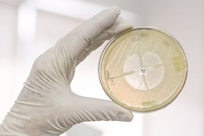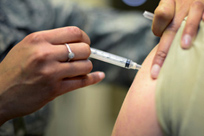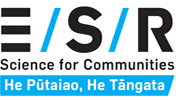Our public health surveillance involves the ongoing, systematic collection, analysis, and interpretation of data on specific health events for use in the planning, implementation and evaluation of public health programmes. This extensive surveillance allows us to identify and characterise individual strains and cases of disease, track any changes in them, and to detect outbreaks and assess the effectiveness of control measures, including vaccines.
ESR manages the Notifiable Diseases Database, and uses this information, along with our reference laboratory information and the information collected from laboratories, to analyse data and provide intelligence on a wide range of diseases including measles, influenza, gastroenteritis, hepatitis and meningococcal disease. Other non-notifiable diseases that ESR undertakes surveillance for are influenza-like illnesses and sexually transmitted infections as well as laboratory surveillance of pathogens of public health importance.
Our Kenepuru and Wallaceville laboratories are open 8am to 4:30pm Monday to Friday.
Can’t find what you're looking for? Contact us at ESR.ExternalEnquiries@esr.cri.nz

Much of this work is undertaken under our agreement with the Ministry of Health and allows us to support our clients to predict where possible, prepare for, identify, respond to actual and potential human biosecurity and public health threats.
Useful links:
- Public Health Surveillance
- Notifiable Disease Database
- List of Notifiable Diseases(external link)
- Sexually Transmitted Infections data
Laboratory-based health surveillance
ESR undertakes laboratory-based surveillance of communicable diseases and pathogens of public health importance. For this surveillance, diagnostic laboratories throughout New Zealand refer specimens or bacterial isolates from their patients to ESR's national reference laboratories for strain identification and epidemiological typing.
Patient specimens and bacterial isolates from the communicable diseases and pathogens listed below should be referred routinely by diagnostic laboratories to the relevant ESR laboratory for typing/surveillance purposes (this does not include specimens for diagnostic testing, nor for requests on a fee for test basis).
Please use a test request form(external link) to submit a specimens or bacterial isolate to ESR.

|
Disease/pathogen |
Lab details |
|
Invasive Pathogens:
|
Invasive Pathogens Laboratory Kenepuru Science Centre 34 Kenepuru Drive, Porirua 5022 |
|
Legionella:
|
Legionella Reference Laboratory Kenepuru Science Centre 34 Kenepuru Drive, Porirua 5022 |
|
Special Bacteriology:
|
Special Bacteriology Laboratory Kenepuru Science Centre 34 Kenepuru Drive, Porirua 5022 |
|
Antibiotic Reference:
|
Antibiotic Reference Laboratory Kenepuru Science Centre 34 Kenepuru Drive, Porirua 5022 |
|
Nosocomial Infections:
|
Nosocomial Infections Laboratory Kenepuru Science Centre 34 Kenepuru Drive, Porirua 5022 |
|
Enteric, Environmental and Food Virology:
|
Enteric, Environmental and Food Virology Laboratory Kenepuru Science Centre 34 Kenepuru Drive, Porirua 5022 |
|
Enteric bacteria:
|
Enteric Reference Laboratory Wallaceville Science Centre 66 Ward Street, Upper Hutt 5018 |
|
Leptospira:
|
Leptospira Reference Laboratory Wallaceville Science Centre 66 Ward Street, Upper Hutt 5018 |
|
Virology:
|
Clinical Virology Laboratory Wallaceville Science Centre 66 Ward Street, Upper Hutt 5018 |
Please note:
- Measles confirmatory NAAT and genotype testing is now performed by Canterbury Health Laboratories, Christchurch
- Identification of fungi and aerobic actinomycetes is performed by the Mycology Reference Laboratory, LabPlus, Auckland

Public Health Surveillance website
ESR manages this site on behalf of the Ministry of Health.

Health testing
Read about ESR's laboratory services for the testing of bacteria and viruses

Evolution of an epidemic
ESR is using genome sequencing to understand a large-scale meningococci epidemic
